Archive
17 April 2024
TU Delft Mechanical Engineering opens new robotics lab
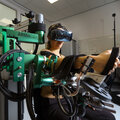
From robots that stock shelves to aid during post-stroke rehabilitation, and from autonomous drones to self-driving cars. All these and more robots can now be found under one roof at TU Delft. On 17 April, the Cognitive Robotics department will open its brand-new lab where not only robots, but also researchers and technicians will come together. This should encourage cross-pollination of knowledge and creative solutions and take research into robotics to the next level.
15 April 2024
Lindert van Biert at NPO Radio 1
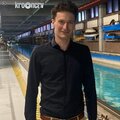
What is more polluting: travelling by boat or plane?
12 April 2024
Jan-Willem van Wingerden about wind farms at NPO Radio 1
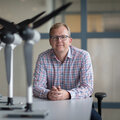
Jan-Willem van Wingerden was invited to talk about his innovative research on wind farm control.
11 April 2024
Girls’ Day 2024: jonge meiden bezoeken ME en CiTG
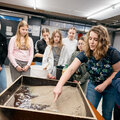
Een speciale dag voor meisjes zodat zij kunnen ervaren hoe waardevol en leuk technische opleidingen zijn. Op 11 april was het weer tijd voor de jaarlijkse Girls’ Day. Bijna 80 leerlingen uit de eerste, tweede en derde klas van scholen uit Leiden en Schiedam kwamen naar de TU Delft en maakten kennis met techniek bij de faculteiten Mechanical Engineering (ME) en Civiele Techniek en Geowetenschappen (CiTG).
04 April 2024
Ron van Ostayen about improved production of chips at BNR Wetenschap Vandaag podcast

Ron van Ostayen vertelt over verbeterde productie van chips door middel van zwevende wafers
02 April 2024
TU Delft and VDL ETG T&D research contactless wafer handling for better chip production
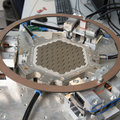
Every time the robotic arm picks up a wafer for placement in the chip machine, very small particles are generated which are harmful for the chip production process. The Faculty of Mechanical Engineering from TU Delft is working on new generation wafer handlers that can handle wafers without particle generation.
21 March 2024
Mechanical engineering at nano-scale requires clean environment
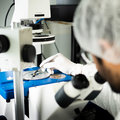
When working at the nanoscale, even a speck of dust can cause disruptions. That is why you find several clean rooms across the TU Delft Campus. In the clean room of Mechanical Engineering, researchers have the unique possibility to build mechanical structures at nanoscale, from top-down by sculpting materials and bottom-up by additive nanomanufacturing. The resulting devices find applications in a variety of fields, from biology to material science.
20 March 2024
Gerard Verbiest in BNR podcast
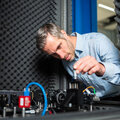
Researcher Gerard Verbiest works on new chip technology using sound. Together with researchers at ASML, he investigates, among other things, how to apply sound to look inside a chip.
19 March 2024
David Abbink in Nieuwsuur about AI in robots

AI is already oftem used in robotics. Can these robots help with staff shortages?
17 March 2024
Arend Schwab at Universiteit van Nederland
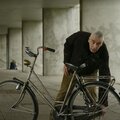
Arend Schwab (founder of the cycling lab at ME) has been researching the art of cycling for years.
13 March 2024
Liselore Tissen in Museum de Lakenhal

What is the effect of the reproduction of artworks on the original? Liselore Tissen was involved in The Van Doesburg experiment in Museum de Lakenhal.
07 March 2024
Rudy Negenborn in BBC News about autonomous shipping

Autonomy, robotics and remote operation, along with artificial intelligence, will transform all transport sectors. In this article, Rudy Negenborn talks about the development and use of robot ships.
07 March 2024
Personalized musculoskeletal models that reflect the diversity of body types
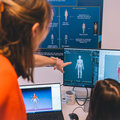
Musculoskeletal models in research are now based on the body of an average male. Scientists from TU Delft, Department of Mechanical Engineering, investigate how accurate these models are for a broad population. The one-size-fits-all approach could hinder proper treatment by doctors and physiotherapists. The researchers are therefore working on personalized musculoskeletal models based on a simple 3D scan.
07 March 2024
Eline van der Kruk en Judith Cueto Fernandez about personalized musculoskeletal models in BNN Breaking

Musculoskeletal models in research are now based on the body of an average male. Scientists from Mechanical Engineering investigate how accurate these models are for a broad population. The one-size-fits-all approach could hinder proper treatment by doctors and physiotherapists.
02 March 2024
Arjo Loeve and Kim Hutchinson at RTL Nieuws about shaken baby experiment
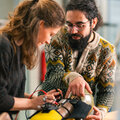
Shaking a baby violently can cause head and neck injuries, blindness and in some cases even death. Researchers at TU Delft, faculty of Mechanical Engineering, are using a dummy baby and computer models to map the accelerations that act on the head during shaking.
23 February 2024
Fully automated robot team successfully cleans litter from seafloor, next step is to go faster and deeper
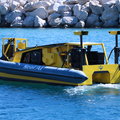
A consortium of European researchers, led by TU Delft, created a functional team of smart robots designed to clean litter from the seafloor. The SeaClear system has successfully passed its last series of tests in both clear and murky waters.
16 February 2024
Tim Horeman in the podcast BNR Wetenschap Vandaag

Tim Horeman talks about the use of sustainable design in healthcare
16 February 2024
Green steel programme receives final approval, marking its official start
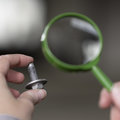
On 12 February, the Growing with Green Steel programme received official approval for a grant of more than 100 million euros from the National Growth Fund. Around 22 million euros of the total sum is destined for TU Delft. The programme aims to develop scientific knowledge and technology for sustainable steel production.
16 February 2024
Jilt Sietsma in Trouw about sustainable steel production

Steel production accounts for 7% of global CO2 emissions. That should and could be more sustainable. That is why 31 parties are joining forces to develop a new set of technologies based on hydrogen, renewable energy and circular iron and steel processing.
12 February 2024
Amir Zadpoor and Mohammad Mirzaali about 'metamaterials' in BNN Breaking
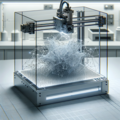
A coating that can hide objects in plain sight, or an implant that behaves exactly like bone tissue. These extraordinary objects are already made from ‘metamaterials’. Researchers from TU Delft have now developed an AI tool that not only can discover such extraordinary materials but also makes them fabrication-ready and durable.
09 February 2024
Mathias Peirlinck in Trouw about cardiac digital twins

Mathias Peirlinck decided to research the heart. To improve treatment options for patients, he wants to understand how the heart works and responds to stimuli.
08 February 2024
New AI tool discovers realistic 'metamaterials' with unusual properties

A coating that can hide objects in plain sight, or an implant that behaves exactly like bone tissue. These extraordinary objects are already made from ‘metamaterials’. Researchers from TU Delft have now developed an AI tool that not only can discover such extraordinary materials but also makes them fabrication-ready and durable.
07 February 2024
Mark van de Ruit in AD about predicting migraine attacks

Hope for people who suffer from migraines: with this model you can predict an attack 24 hours in advance.
07 February 2024
Paul Breedveld in AD about an ultra-thin and steerable needle
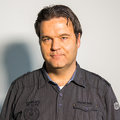
Paul Breedveld, professor of Medical Instruments & Bio-Inspired Technology developed an ultra-thin, flexible and steerable needle with PhD student Marta Scali and fellow researcher Dimitra Dodou.
07 February 2024
Inaugural speech: ‘Trading heat for a sustainable future’
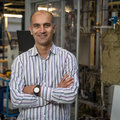
Commodifying heat. That is the ultimate goal of TU Delft professor of Heat Transformation Technology Kamel Hooman. In the future, consumers could store heat they do not use and sell it in a market. In this way, total energy loss could be halved. Crucial here is that heat can be efficiently stored and transported. Hooman will explain how he intends to achieve this in his inaugural speech on 7 February.
06 February 2024
Jan-Willem Klok and Winfred Mugge about robots in surgery
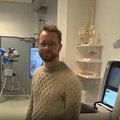
Can robots take over the tasks of surgeons?
05 February 2024
TU Delft develops model to better understand injuries to babies caused by violent shaking
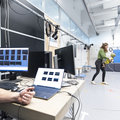
Shaking a baby violently can cause head and neck injuries, blindness and in some cases even death. Researchers at TU Delft, faculty of Mechanical Engineering, are using a dummy baby and computer models to map the accelerations that act on the head during shaking. They want to be able to assess the risk of injury more accurately. This could eventually lead to more clarity in legal cases on the subject.
19 January 2024
Earl Goetheer in Trouw about capturing CO2 in water

Will this help to solve the climate crisis? And what are the effects on sea life?
19 January 2024
Interview with David Abbink by NEMO Kennislink

How can robots help in the health & care sector?
18 January 2024
Inaugural lecture: ‘Fundamental knowledge on thermal fluid science is crucial to accelerate the energy transition’
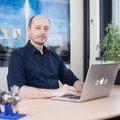
In his inaugural lecture on January 19, TU Delft professor of Thermal and Fluids Engineering, Rene Pecnik, states that providing more fundamental insight into thermal fluid science is needed to design highly efficient and reliable equipment that contribute to the energy transition.
10 January 2024
Amir Zadpoor in BNR De Technoloog podcast

Using a unique 3D printing process, TU Delft researchers produced hybrid multi-material interfaces that reached a remarkable closeness to nature’s design of bone-tendon connections.
08 January 2024
New year, new name: 3mE is now called Mechanical Engineering

The Faculty of Mechanical, Maritime and Materials Science (3mE) is starting the new year with a new name: Mechanical Engineering (ME). The name change took effect from 1 January.
05 January 2024
Richard Norte's research about a new ultra strong material in BNN Breaking

A material that doesn't just rival the strength of diamonds and graphene, but boasts a yield strength 10 times greater than Kevlar, renowned for its use in bulletproof vests.
14 December 2023
Inaugural speech: 'Technology is crucial for reducing workload in operating room’
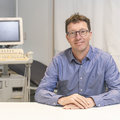
Long waiting lists, delayed surgeries and high costs. According to professor of Medical Process Engineering, John van den Dobbelsteen, this is partly due to insufficient attention to the surgical process when implementing new technology. He wants to improve the interaction between medical staff and medical technology with the aim of reducing the workload. He will deliver his inaugural speech on 15 December.
13 December 2023
NWO grant for developing multi-purpose flat optical components
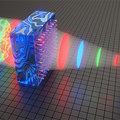
More and better optics with less. That is the ambition of the AWAVE consortium, led by TU Delft. The researchers will develop a flat optical component that might replace all curved optical components, such as lenses, in the future. This flat component should also be easy to recycle and contain fewer harmful substances.
12 December 2023
Optimisation of hard-soft material interfaces: A 3D printed imitation of bone-tendon connections
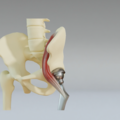
08 December 2023
New 3D co-culture model to study the effect of proton therapy on aggressive brain cancer
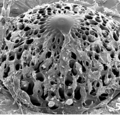
Researchers at TU Delft designed novel 3D-engineered scaffolds inspired by the geometry of the brain microvasculature. The micro-structures were co-cultured with both glioblastoma, an aggressive brain cancer, and endothelial cells, the building blocks of blood vessels. This model enabled researchers to study the effect of proton therapy on glioblastoma and uncovered a possible protective role of endothelial cells on cancer cells.
04 December 2023
Study choice guide: Clinical Technology is top programme

In the Keuzegids Universities 2024, the bachelor's programme Clinical Technology has been labelled top programme for the second time. This study programme is a collaboration between TU Delft, LUMC and Erasmus MC.
30 November 2023
From powder to product: new TU Delft lab covers entire 3D printing process
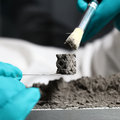
Advances in aerospace and energy transition require materials that meet ever-increasing demands. Such as extreme environments, high pressures or temperatures. In TU Delft's Materials for Additive Manufacturing lab, researchers can now explore new materials and process them into products and components for extreme conditions. This unique lab was opened on 30 November.
23 November 2023
ERC Consolidator Grant for ultra-sensitive 2D material membranes in frequency-based metrology and bacteria sensing

Last year, scientists at TU Delft achieved a remarkable feat by using graphene to capture the sound of an individual bacterium. In order to improve these kind of 2D ultra-sensitive sensors, the nanomechanics of this material have to be studied in more detail. Farbod Alijani, associate professor at the faculty of Mechanical, Maritime and Material Engineering, received an ERC Consolidator Grant for this project.